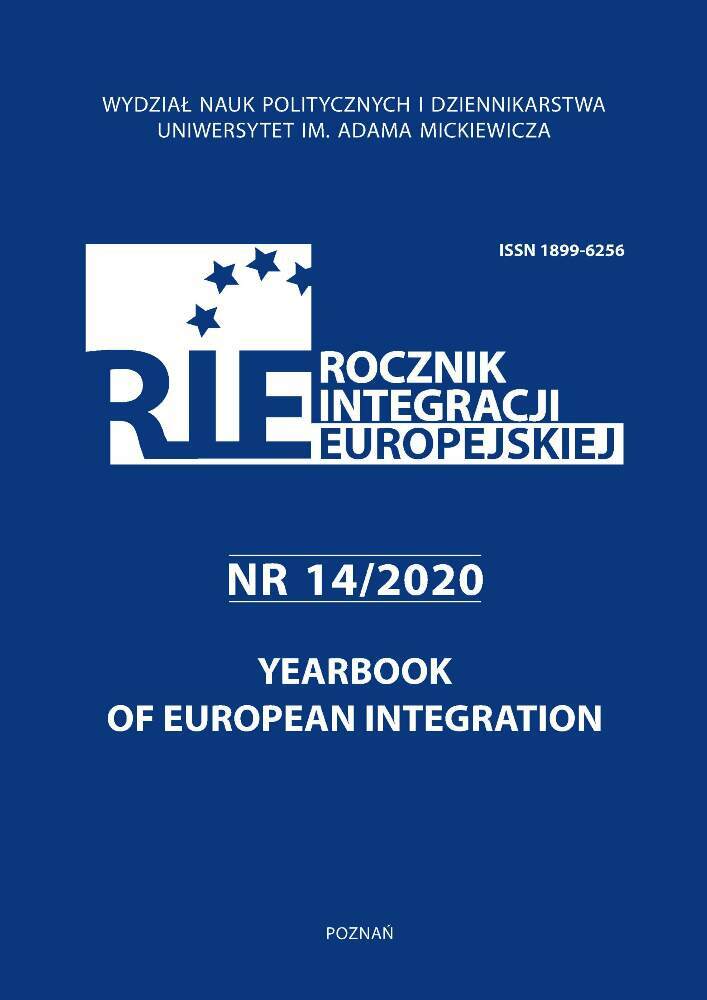Abstract
Polexit is a concept that emerged in the political science discourse when the United Kingdom held a referendum on its continued membership of the European Union on June 26, 2016. The article analyzes the reasons which facilitate a discussion on the withdrawal of Poland from the European Union. On the one hand, this results from disputes on the direction of the evolution of the European project between ‘old’ and ‘new’ member states. On the other, its intensity is affected by the dynamics of the dispute between the Polish government and the European Commission on the state of the rule of law in Poland. For supporters of a change in relations between European institutions and member states, the European parliamentary elections offered an opportunity of starting a discussion on the change of treaties. However, due to the fact that proponents of treaty changes failed to win the appropriate number of seats, the vision of an EU of ‘two speeds’ is becoming realistic. This may mark the beginning of a sequence of events concluded with a referendum on the withdrawal of Poland from the European Union.
References
Assheuer Th. (2017), Macrons grosser Moment. Der französische Präsident setzt auf eine Karte. Er ist Europas letzte Hoffnung, “Die Zeit“, 19.10.2017.
Brubaker R. (1999), Nacjonalizm inaczej. Struktura narodowa i kwestie narodowe w Nowej Europie, Wydawnictwo Naukowe PWN, Warszawa–Kraków.
Delanty G. (1999), Odkrywanie Europy. Idea, tożsamość, rzeczywistość, Wydawnictwo Naukowe PWN, Warszawa–Kraków.
Delsol Ch. (2018), Rewolucja konserwatywna przechodzi przez Europę, “Wszystko co Najważniejsze”, Warszawa.
Hall A. (2018), Wpływ prezydentury Emmanuela Macrona na rozwój integracji europejskiej i interesy Polski, in: Polska w Unii Europejskiej. Nowe wyzwania, eds. J. Barcz, R. Kuligowski, M. Szewczyk, E. Szklarczyk-Amati, Komisja Europejska Przedstawicielstwo w Polsce, Warszawa.
Kleiber M. (2017), Europa – razem czy osobno?, “Wszystko co Najważniejsze”, Warszawa.
Kupiecki R. (2016), Organizacja Traktatu Północnoatlantyckiego, Wydawnictwo Ministerstwa Obrony Narodowej, Warszawa.
Morawiecki M. (2018) Polski plan dla Europy, “Wszystko co Najważniejsze”, Warszawa.
Offe C. (1999), Drogi transformacji. Doświadczenia wschodnioeuropejskie i wschodnioniemieckie, Wydawnictwo Naukowe PWN, Warszawa–Kraków.
Prawda M. (2018), Krajobraz po szoku, in: Polska w Unii Europejskiej. Nowe wyzwania, eds. J. Barcz, R. Kuligowski, M. Szewczyk, E. Szklarczyk-Amati, Komisja Europejska Przedstawicielstwo w Polsce, Warszawa.
Przemówienie premiera Mateusza Morawieckiego z okazji 15. rocznicy przystąpienia Polski do Unii Europejskiej (2019), https://www.premier.gov.pl/wydarzenia/aktualnosci/przemowienie-premiera-mateusza-morawieckiego-z-okazji-15-rocznicy.html, 30.06.2019.
Szułdrzyński M. (2016), Musimy wyjść z inicjatywą zmian w UE, “Rzeczpospolita” of 27.06.2016.
Traktat o Unii Europejskiej (1992), Dz. Urz. UE C 191, 29.07.1992.
Traktat z Amsterdamu zmieniający Traktat o Unii Europejskiej, Traktaty ustanawiające Wspólnoty Europejskie oraz niektóre związane z nimi akty, http://oide.sejm.gov.pl/oide/index.php?option=com_content&view=article&id=14425&Itemid=426.

